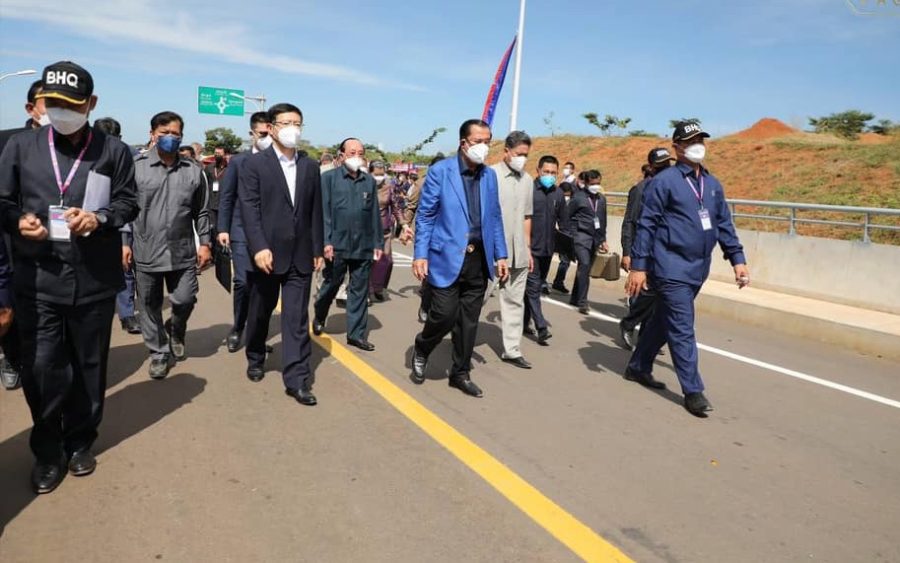Inaugurating a new $60-million, Chinese-funded Mekong river bridge this week, Prime Minister Hun Sen said no amount of international pressure could deter him from his goals of stability and peace.
The inauguration, for the Cambodia-China Friendship Bridge between Kampong Cham and Tbong Khmum provinces, saw Hun Sen deny that the country had any political prisoners, pledge that he would eliminate “extremism” in an apparent reference to the country’s political opposition, and speak of paving the way for future generations.
Hun Sen on Tuesday relitigated the 1970 coup against King Norodom Sihanouk as having been backed by “democratic countries.” The subsequent Lon Nol government was considered U.S.-friendly, and later toppled by the rise of the Khmer Rouge.
Hun Sen was part of Vietnam-backed efforts to dislodge the Khmer Rouge, the 1975-79 regime whose leaders of have been indicted for genocide. The democratic countries then supported the Khmer Rouge in the U.N. as a government in exile for 12 years, Hun Sen recalled.
“Have they ever shown remorse for their wrongdoing? Democratic countries turned to support a military coup,” he said.
“This time, no! I would like to clarify ahead that, at any cost, Hun Sen will not bow down to any pressure that leads to instability and the loss of the country’s peace.”
He said there were no political prisoners in Cambodia — only prisoners who used to be politicians. Human Rights Watch has said there are more than 60 political prisoners in the country, mostly from the dissolved opposition CNRP.
“Hun Sen would like to announce again in my homeland: No matter how many more years my mandate is extended, it is up to me if people still vote for me. … So let me play with those extremists,” he said. “I will finish playing with you guys and then I will pave the way for the younger generation.”
He said Cambodia would not move backward, noting the country’s reopening from Covid-19 thanks to high vaccination rates.
“That’s why I have to continue the mission to get rid of extremism among some people, to guarantee peace for Cambodia and develop for the future,” he said, condemning overseas opposition figures who continue to criticize him from exile, while also daring them to protest against him at the World Economic Forum in Switzerland in January.
CNRP vice president Mu Sochua pointed out that the outlawed opposition party had won nearly half the vote.
“If we are extremists, I think that more than half of the people of the kingdom are able to judge and choose their representatives,” she said, adding that she believes that only national reconciliation could prevent a political crisis in the future.
Political analyst Kim Sok, who is in exile, said Hun Sen seemed to have had political succession in mind in again attacking the opposition.
“Giving an opposition group the opportunity to engage in political activity in Cambodia … is an instability of power for Hun Sen and his son. That is why he announced that he will use his last life to clean up the opposition, to clear the way for his son’s power.”
Former CNRP lawmaker Ou Chanrath, who heads the newly-formed Cambodia Reform Party, said the prime minister’s words could spur local officials to target people who are affiliated with the opposition.
“With such a message, officials will be even more encouraged and they have [previously] gone beyond the message of the leader,” Chanrath said.
For Korn Savang, who works at election watchdog Comfrel, Hun Sen’s comment would be a deterrent to young people looking to be politically active. Threats against potential politicians were not good for a democratic country with an electoral system.
“The combination of words, from destroying [the opposition] to the use of violence, will not be a good thing [but] will make them fearful and make them lose belief,” Savang said.












